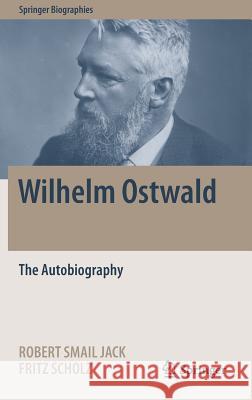Wilhelm Ostwald: The Autobiography » książka



Wilhelm Ostwald: The Autobiography
ISBN-13: 9783319469539 / Angielski / Twarda / 2017 / 688 str.
Wilhelm Ostwald: The Autobiography
ISBN-13: 9783319469539 / Angielski / Twarda / 2017 / 688 str.
(netto: 691,70 VAT: 5%)
Najniższa cena z 30 dni: 655,41
ok. 16-18 dni roboczych.
Darmowa dostawa!
This book is the translated and commented autobiography of Wilhelm Ostwald (1853-1932), who won the Nobel Prize for Chemistry in 1909.
"This is a long-needed English translation of the autobiography of the great German/Latvian physical chemist, Wilhelm Ostwald ... . I can't express enough my admiration for this wonderful translation, which has, for the first time, made this virtually untapped treasure trove of previously unexploited personal impressions of late 19th- and early 20th-century European chemistry, by one of its most important participants, available to English-speaking historians of chemistry. ... In general Jack's translation is excellent ... ." (William B. Jensen, Bulletin for the History of Chemistry, Vol. 47 (3), 2022)
"Ostwald was well known as an engaging writer, and this translated work is very readable. The book provides interesting insight into the development of chemistry and is recommended to libraries that support a history of science program. Summing Up: Recommended. Upper-division undergraduates and above; faculty and professionals." (H. E. Pence, Choice, Vol. 54 (12), August, 2017)"'Wilhelm Ostwald: The Autobiography' is an important contribution to the history of physical chemistry. It restores Ostwald to his rightful place as one of the founders of modern electrochemistry. It also sheds light on the extraordinary efflorescence of German science in fin de siècle Europe. I would recommend the book to anyone with an interest in the sociology of science or the history of physical chemistry." (Stephen Fletcher, Journal of Solid State Electrochemistry, Vol. 21, 2017)Part 1: Riga-Dorpat-Riga: My parental home and childhood.- Youth.- The growing boy.- Student years.- The start of my scientific career.- Teaching and marriage.- My first appointment.- The professorship in Riga.- Germany.- Back in Riga.- My colleague.- Progress.- The appointment in Leipzig.- Part 2: Leipzig: Leaving home.- The new work place and the first fruits.- The laboratory.- At the writing desk.- The Leipzig circle.- The spread of the concept in Germany.- Impact at a distance.- Energetics.- Overload, breakdown and recovery.- The electrochemical society.- Catalysis and the new institute.- Nitrogen.- Natural philosophy.- First journey to America.- Taking leave of chemistry.- An international congress of all the arts and sciences.- Free!.- Part 3: Großbothen and the world.- The doctrine of happiness and its applications.- The exchange professor.- Country house “Energy”.- Great men and the schools.- The world language.- Festive days.- The Monist Society.- The International Union of Chemists.- The Bridge.- The energetic imperative.- World war and revolution.- The theory of colour.- The beauty of the law.- The noise of the streets and the peace of the garden.
Robert Smail Jack is an emeritus professor from the Institute for Immunology and Transfusion Medicine, University of Greifswald, Germany. A native English speaker who has been living in Germany for many years, he has a vital interest in the history of science, and in making historical facts available for a broader audience. Combined with his scientific background, this made him an ideal candidate for translating Wilhelm Ostwald’s autobiography.
Fritz Scholz is the Chair of Analytical and Environmental Chemistry at Greifswald University’s Institute of Biochemistry. He has several years experience as an editor and author, e.g. as Editor-in-Chief of the Journal of Solid State Electrochemistry, of the new textbook journal ChemTexts, as Series Editor for the book series Monographs in Electrochemistry, and numerous book projects, in particular in the field of Electrochemistry. In his spare time, Fritz Scholz has a vital interest in the history of science, especially of chemistry and physics.
Together the two editors form an optimal team to provide a painstakingly accurate translation of Wilhelm Ostwald’s autobiography, enriched with explanatory comments and background information to help readers understand the historical context. Wilhelm Ostwald was one of the most outstanding personalities in physical chemistry in the early 20th century, and has left enormous impacts still visible today. In his autobiographical reflections, readers will find a wealth of information, which will open up a new perspective on the historical development of physical chemistry as experienced by an eyewitness. Robert Jack and Fritz Scholz have now made this record of contemporary scientific history available for an international audience for the first time.
This book is the translated and commented autobiography of Wilhelm Ostwald (1853-1932), who won the Nobel Prize for Chemistry in 1909. It is the first translation of the German original version “Lebenslinien: Eine Selbstbiographie,” published by Ostwald in 1926/27, and has been painstakingly translated. The book includes comments and explanations, helping readers to understand Ostwald’s text in the historical context of Germany at the beginning of the 20th century.
1997-2026 DolnySlask.com Agencja Internetowa
KrainaKsiazek.PL - Księgarnia Internetowa









